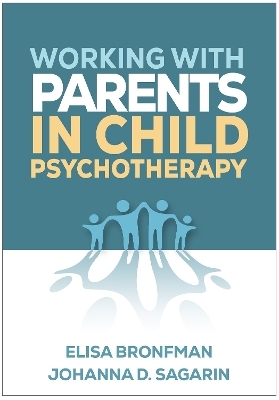
Working with Parents in Child Psychotherapy
Guilford Press (Verlag)
978-1-4625-5447-8 (ISBN)
- Lieferbar (Termin unbekannt)
- Versandkostenfrei innerhalb Deutschlands
- Auch auf Rechnung
- Verfügbarkeit in der Filiale vor Ort prüfen
- Artikel merken
Elisa Bronfman, PhD, is senior staff psychologist at Boston Children's Hospital, where she specializes in supporting children, teens, and families coping with medical illness. Since joining the hospital in 1998, she has provided training, supervision, and individual and family psychotherapy, and has run numerous patient and caregiver groups targeting a range of child issues. Dr. Bronfman is also Assistant Professor in the Department of Psychiatry at Harvard Medical School. She is coauthor of the Atypical Maternal Behavior Instrument for Assessment and Classification (AMBIANCE), a research tool used to assess parent/n-/infant attachment, on which she provides training nationally and internationally, and of journal articles and books on a range of topics. Johanna D. Sagarin, PhD, is Assistant Professor in the Department of Psychology at Assumption University and a psychologist in private practice. Previously, Dr. Sagarin was Vice President of Children’s Friend, in Worcester, Massachusetts, where she directed their community mental health clinic for youth and families for close to two decades. In this setting, she helped develop specialized programs in grief and in working with LGBTQIA+ youth and their families. She has supervised and consulted with many clinicians, has been active in university-level teaching for many years, and has given numerous trainings and workshops for professionals and the public.
Introduction: An Integrative Approach to Parent Guidance
I. Foundations of Parent Guidance
1. Contributors to Parenting Patterns
2. Strategies for Partnering: Nurturing the Critical Relationships
3. An Assessment to Guide Treatment
II. What You Need to Know to Choose Effective Parent Guidance and Develop Parenting Skills
4. Developing the Path for Intervention
5. Strengthening Optimal Parenting
6. Building Proactive Competence with Parents
III. Choosing and Using Treatment Strategies: Intervening with Common Problems
7. An Introduction to Assessing and Addressing Common Problems (the Usual Suspects)
8. Daily Struggles: Homework, Bedtime, Eating, and Hygiene
9. Other Common Problems That Lead to Frequent Arguments: Digital Media, Going to School, Extracurricular Activities, and Sibling Conflict
IV. Making the Most of Your Behavioral Interventions
10. Commands, Praise, and Feedback
11. Monitoring Behavior as an Intervention
12. Working with Motivational Systems
V. Specific Problems in the Caregiver
13. Helping the Caregiver Who Has Anxiety or Mood Regulation Issues
14. Helping the Caregiver When There Is a Relationship Problem with the Child
15. Helping the Caregiver Who Makes the Problem Worse
VI. When Something Goes Wrong: Potential Pitfalls in Parent Guidance
16. Pitfalls with the Parent or with the Therapist
17. Pitfalls in the Therapeutic Process
18. Legal and Ethical Concerns: Avoiding Dangers and Reducing Risk
VII. PACT in Action
19. Assessing Progress and Ending Treatment
20. Using PACT to Steer Your Integrative Parent Guidance: A Case Example
Appendix A. Resources for Clinicians
Appendix B. Other Services a Family May Benefit From
References
Index
| Erscheinungsdatum | 21.10.2024 |
|---|---|
| Verlagsort | New York |
| Sprache | englisch |
| Maße | 178 x 254 mm |
| Themenwelt | Sachbuch/Ratgeber ► Gesundheit / Leben / Psychologie |
| Geisteswissenschaften ► Psychologie ► Entwicklungspsychologie | |
| Geisteswissenschaften ► Psychologie ► Familien- / Systemische Therapie | |
| Medizin / Pharmazie ► Medizinische Fachgebiete ► Psychiatrie / Psychotherapie | |
| Sozialwissenschaften ► Pädagogik ► Sozialpädagogik | |
| Sozialwissenschaften ► Soziologie | |
| ISBN-10 | 1-4625-5447-4 / 1462554474 |
| ISBN-13 | 978-1-4625-5447-8 / 9781462554478 |
| Zustand | Neuware |
| Haben Sie eine Frage zum Produkt? |
aus dem Bereich


